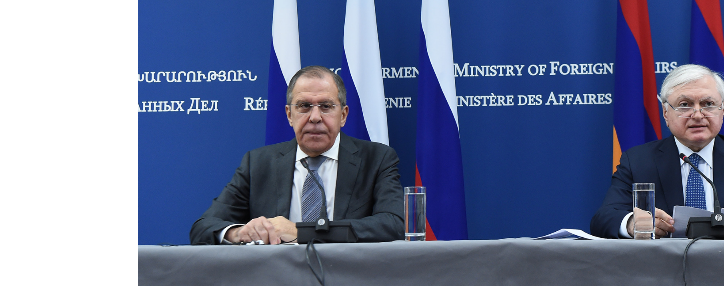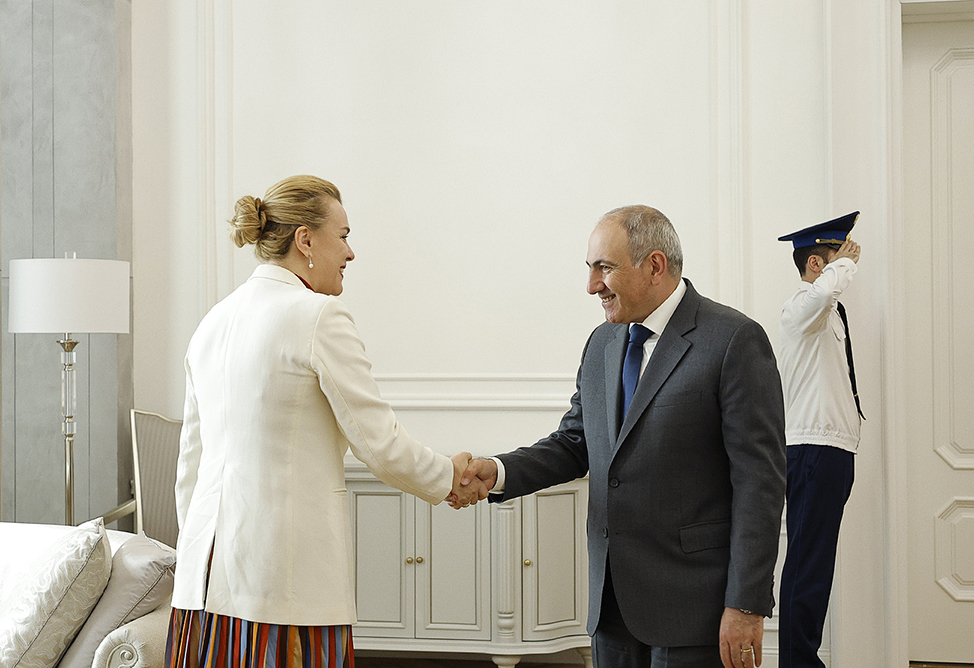OSCE Minsk Group co-chairs proposals on Karabakh conflict settlement remain matter of talks in package
21.11.2017,
13:59
OSCE Minsk Group co-chairs’ all proposals on Karabakh conflict settlement remain matter of negotiation, Russian Foreign Minister Sergey Lavrov said Tuesday at a joint briefing with his Armenian counterpart Edward Nalbandian.

YEREVAN, November 21. /ARKA/. OSCE Minsk Group co-chairs’ all proposals on Karabakh conflict settlement remain matter of negotiation, Russian Foreign Minister Sergey Lavrov said Tuesday at a joint briefing with his Armenian counterpart Edward Nalbandian.
“I have already mentioned the presence of all components of this problem, which are included in many documents,” he said. “Since 2007, 2009 and 2011, they have been submitted to the OSCE Secretary General and this means they have been confirmed as proposals of the co-chairs. They all in the lump remain on the table.”
The minister stressed that these proposals are in one package and this is very difficult to take one or two of them as basis for negotiation, since balancing components in this case will fall out and the desired result will not be achieved.
He called Armenian and Azerbaijani presidents’ positive comments on their latest meeting in Geneva useful.
Lavrov finds it important to use this positive attitude for achieving results in the conflict settlement.
He said that Armenian and Azerbaijani foreign ministers met with the three co-chairs in Moscow and stressed that the Russian side along with its American and French colleagues will analyze these meetings.
“We should assess where we are,” he said. “We’ll try to make active efforts to lay groundwork for achieving the settlement, but I am not too optimistic – this problem is difficult and the experience of our talks shows that unfortunately they will not be completed soon.”
Karabakh conflict broke out in 1988 when Karabakh, mainly populated by Armenians, declared its independence from Azerbaijan.
On December 10, 1991, a few days after the collapse of the Soviet Union, a referendum took place in Nagorno-Karabakh, and the majority of the population (99.89%) voted for secession from Azerbaijan.
Afterwards, large-scale military operations began. As a result, Azerbaijan lost control over Nagorno-Karabakh and the seven regions adjacent to it.
Some 30,000 people were killed in this war and about one million people fled their homes.
On May 12, 1994, the Bishkek cease-fire agreement put an end to the military operations.
Тalks brokered by OSCE Minsk Group are being held over peaceful settlement of the conflict. The group is co-chaired by USA, Russia and France. --0-----
“I have already mentioned the presence of all components of this problem, which are included in many documents,” he said. “Since 2007, 2009 and 2011, they have been submitted to the OSCE Secretary General and this means they have been confirmed as proposals of the co-chairs. They all in the lump remain on the table.”
The minister stressed that these proposals are in one package and this is very difficult to take one or two of them as basis for negotiation, since balancing components in this case will fall out and the desired result will not be achieved.
He called Armenian and Azerbaijani presidents’ positive comments on their latest meeting in Geneva useful.
Lavrov finds it important to use this positive attitude for achieving results in the conflict settlement.
He said that Armenian and Azerbaijani foreign ministers met with the three co-chairs in Moscow and stressed that the Russian side along with its American and French colleagues will analyze these meetings.
“We should assess where we are,” he said. “We’ll try to make active efforts to lay groundwork for achieving the settlement, but I am not too optimistic – this problem is difficult and the experience of our talks shows that unfortunately they will not be completed soon.”
Karabakh conflict broke out in 1988 when Karabakh, mainly populated by Armenians, declared its independence from Azerbaijan.
On December 10, 1991, a few days after the collapse of the Soviet Union, a referendum took place in Nagorno-Karabakh, and the majority of the population (99.89%) voted for secession from Azerbaijan.
Afterwards, large-scale military operations began. As a result, Azerbaijan lost control over Nagorno-Karabakh and the seven regions adjacent to it.
Some 30,000 people were killed in this war and about one million people fled their homes.
On May 12, 1994, the Bishkek cease-fire agreement put an end to the military operations.
Тalks brokered by OSCE Minsk Group are being held over peaceful settlement of the conflict. The group is co-chaired by USA, Russia and France. --0-----



